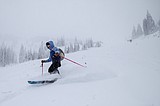Sen. Cuffe seeks to combine conservation commissions
KATE HESTON | Hagadone News Network | UPDATED 2 years, 10 months AGO
Kate Heston covers politics and natural resources for the Daily Inter Lake. She is a graduate of the University of Iowa's journalism program, previously worked as photo editor at the Daily Iowan and was a News21 fellow in Phoenix. She can be reached at [email protected] or 406-758-4459. | January 25, 2023 11:00 PM
A bill that would create a Western Montana Conservation Commission — repealing the Flathead Basin Commission and the Upper Columbia Conservation Commission — had its first hearing in the Senate Natural Resources Committee on Monday.
Senate Bill 83, sponsored by Sen. Mike Cuffe, R-Eureka, is an agency bill brought forward by the Department of Natural Resources and Conservation. People who spoke at Monday’s hearing in favor of the legislation referred to the proposal as a bill of efficiency.
The Flathead Basin Commission was created in 1983 by the Montana Legislature to monitor and protect water quality and natural resources in the Flathead Basin. The group played a critical part in establishing a moratorium on mining in the North Fork of the Flathead River between Montana and British Columbia. Efforts also focused on aquatic invasive species, and more recently on other threats to water quality, such as leaching septic systems.
The Upper Columbia Conservation Commission, also known as UC3, was created in the 2017 Legislature after Cuffe brought forward a bill in response to invasive aquatic mussels found in Tiber Reservoir and Canyon Ferry.
Over time, the commissions and their goals overlapped, meaning that it was time to consolidate, Cuffe said during the hearing.
The Flathead Basin Commission and UC3 have a shared staff, offices, partners, and are constructed in a similar model, according to Mike Bostrom, the administrator of conservation resource development at the DNRC. Proponents of the bill say the benefits could include fewer issues for staffing, soliciting and appointing members.
The bill is a part of Gov. Greg Gianforte’s so-called red tape relief initiative, which reviewed all state agencies to implement reforms.
“DNRC came up with this proposal after a lot of thought to really take two excellent and outstanding commissions and put them together,” Montana Lt. Gov. Kristen Juras said in her proponent testimony on behalf of the Governor’s Office.
According to the bill, the Western Montana Conservation Commission would be tasked with monitoring natural resources across the region, while developing a five-year monitoring strategy. It would also support an aquatic invasive species prevention program, encourage international coordination between the state and British Columbia, and work on projects that reduce water pollution.
The commission would consist of 16 voting members and be attached to the DNRC. The governor would appoint nine of the voting members who will represent hydropower companies and electric cooperatives, private landowners and officials who work in the natural resources realm. The Flathead Basin Commission and UC3 would each nominate two commissioners to the governor to serve through July of 2025.
The seven other members would include representatives of urban and rural counties in western Montana, a municipality, the CSKT, a local water and sewer district, and a wastewater or stormwater utility.
The commissioners will serve without pay, with voting members serving four-year terms.
ACCORDING TO Bostrom, the bill will help provide continuity to existing programs.
Bostrom drafted SB 83 on behalf of the DNRC. He was also involved in drafting the statue that created the UC3 in 2017.
“I feel like we can do this without a loss,” Bostrom told the Inter Lake.
Mike Koopal, the founder and executive director of the Whitefish Lake Institute, has served as a commissioner for both Flathead Basin Commission and UC3, and he currently chairs Flathead Basin Commission’s technical committee on onsite wastewater treatment committee.
Koopal expressed concerns about the proposed commission merger, saying that the Flathead Basin Commission’s focus could be diluted.
“The Flathead Basin Commission has served as an umbrella organization connecting agencies and partnering groups to effectively address water quality issues,” he told the Inter Lake in an email.
Despite the concern, Koopal noted that the merger would be an effective step toward increased efficiency.
“I trust that they will present a staffing and logistics plan to ensure that a new commission can effectively serve Montana,” Koopal added.
Other groups testified at the hearing on Monday in support of SB 83, including representatives from the Department of Environmental Quality, and Montana Fish, Wildlife and Parks.
The bill will be voted on in the Senate Natural Resources Committee, although a date and time has not been specified. If it passes the first committee, it will go back to the Senate floor for a second reading.
Reporter Kate Heston can be reached at [email protected].
ARTICLES BY KATE HESTON

Veteran-owned mobile boat repair service anchors down in the Flathead Valley
The Kramers launched Flathead Mobile Marine to use their skills — they have decades of experience performing routine maintenance checks on a variety of boats as well as working with engines and electrical systems — and help boaters in the community.

With ski season near, resort reaches deal with staff
After 18 months of negotiations, Whitefish Mountain Resort executives and the resort’s ski patrol union are finalizing a one-year contract for the upcoming season.

Trapped in a car wreck, Woods Bay woman credits teens with saving her life
Driving home from a quilting event in Bigfork in September of last year, Carol Martin remembered that the sky was clear, the sun was shining, and she had a headache.

